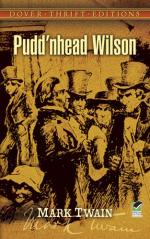CHAPTER 3 — Roxy Plays a Shrewd Trick
Whoever has lived long enough to find out what life is, knows how deep a debt of gratitude we owe to Adam, the first great benefactor of our race. He brought death into the world. —Pudd’nhead Wilson’s Calendar
Percy Driscoll slept well the night he saved his house minions from going down the river, but no wink of sleep visited Roxy’s eyes. A profound terror had taken possession of her. Her child could grow up and be sold down the river! The thought crazed her with horror. If she dozed and lost herself for a moment, the next moment she was on her feet flying to her child’s cradle to see if it was still there. Then she would gather it to her heart and pour out her love upon it in a frenzy of kisses, moaning, crying, and saying, “Dey sha’n’t, oh, dey sha’nt’!’—yo’ po’ mammy will kill you fust!”
Once, when she was tucking him back in its cradle again, the other child nestled in its sleep and attracted her attention. She went and stood over it a long time communing with herself.
“What has my po’ baby done, dat he couldn’t have yo’ luck? He hain’t done nuth’n. God was good to you; why warn’t he good to him? Dey can’t sell you down de river. I hates yo’ pappy; he hain’t got no heart—for niggers, he hain’t, anyways. I hates him, en I could kill him!” She paused awhile, thinking; then she burst into wild sobbings again, and turned away, saying, “Oh, I got to kill my chile, dey ain’t no yuther way—killin’ him wouldn’t save de chile fum goin’ down de river. Oh, I got to do it, yo’ po’ mammy’s got to kill you to save you, honey.” She gathered her baby to her bosom now, and began to smother it with caresses. “Mammy’s got to kill you—how kin I do it! But yo’ mammy ain’t gwine to desert you—no, no, dah, don’t cry—she gwine wid you, she gwine to kill herself too. Come along, honey, come along wid mammy; we gwine to jump in de river, den troubles o’ dis worl’ is all over—dey don’t sell po’ niggers down the river over yonder.”
She stared toward the door, crooning to the child and hushing it; midway she stopped, suddenly. She had caught sight of her new Sunday gown—a cheap curtain-calico thing, a conflagration of gaudy colors and fantastic figures. She surveyed it wistfully, longingly.
“Hain’t ever wore it yet,” she said, “en it’s just lovely.” Then she nodded her head in response to a pleasant idea, and added, “No, I ain’t gwine to be fished out, wid everybody lookin’ at me, in dis mis’able ole linsey-woolsey.”
She put down the child and made the change. She looked in the glass and was astonished at her beauty. She resolved to make her death toilet perfect. She took off her handkerchief turban and dressed her glossy wealth of hair “like white folks”; she added some odds and ends of rather lurid ribbon and a spray of atrocious artificial flowers; finally she threw over her shoulders a fluffy thing called a “cloud” in that day, which was of a blazing red complexion. Then she was ready for the tomb.




